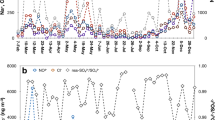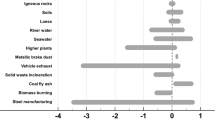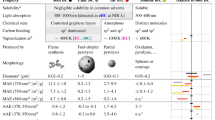Abstract
Recent studies in the Alaskan Arctic1–3 show the presence of substantial concentrations of carbon- and sulphur-containing particles that seem to be characteristic of the Arctic region as a whole4–6. These particles are effective scatterers and absorbers of visible radiation3,7 and appear to be responsible for the phenomenon of Arctic haze first reported by Mitchell8. On the basis of trace element analysis, it has been suggested that these particles originate from anthropogenic sources at mid-latitudes1,4. Direct substantiation of combustion-generated particles in the Arctic atmosphere has been provided by the identification of large concentrations of graphitic carbon particles at the GMCC–NOAA (National Oceanic and Atmospheric Administration) observatory near Barrow, Alaska, using Raman spectroscopy3. We report here on an extension of our studies of carbon particles in the Alaskan Arctic to the Canadian Arctic and the Norwegian Arctic. These studies, using the Raman scattering technique, identify substantial concentrations of graphitic carbon particles at ground-level stations throughout the western Arctic.
This is a preview of subscription content, access via your institution
Access options
Subscribe to this journal
Receive 51 print issues and online access
$199.00 per year
only $3.90 per issue
Buy this article
- Purchase on Springer Link
- Instant access to full article PDF
Prices may be subject to local taxes which are calculated during checkout
Similar content being viewed by others
References
Rahn, K. A. & McCaffrey, R. J. Ann. N.Y. Acad. Sci. 338, 486–503 (1980).
Shaw, G. E. Atmos. Envir. 15, 1483–1489 (1981).
Rosen, H., Novakov, T. & Bodhaine, B. A. Atmos. Envir. 15, 1371–1374 (1981).
Barrie, L. A., Hoff, R. M. & Duggupaty, S. M. Atmos. Envir. 15, 1407–1419 (1981).
Ottar, B. Atmos. Envir. 15, 1439–1445 (1981).
Heintzenberg, J. Tellus 32, 251–260 (1980).
Bodhaine, B. A., Harris, T. M. & Herbert, G. A. Atmos. Envir. 15, 1375–1389 (1980).
Mitchell, J. M. Jr J. atmos. terr. Phys., Spec. Suppl., 195–211 (1957).
Shaw, G. E. & Stamnes, K. Ann. N.Y. Acad. Sci. 338, 533–539 (1980).
Porch, W. M. & MacCracken, M. C. Atmos. Envir. 16, 1365–1371 (1981).
Cess, R. D. Atmos. Envir. (in the press).
Tuinstra, F. & Koenig, J. L. J. chem. Phys. 53, 1126–1130 (1970).
Wolff, G. T. & Klimisch, R. L. (eds) Particulate Carbon: Atmospheric Life Cycle (Plenum, New York, 1982).
Rosen, H., Hansen, A. D. A., Gundel, L. & Novakov, T. Appl. Opt. 17, 3859–3861 (1978).
Rosen, H., Hansen, A. D. A., Dod, R. L. & Novakov, T. Science 208, 741–743 (1980).
Angell, C. L. & Lewis, I. C. Carbon 16, 431–432 (1978).
Author information
Authors and Affiliations
Rights and permissions
About this article
Cite this article
Rosen, H., Novakov, T. Combustion-generated carbon particles in the Arctic atmosphere. Nature 306, 768–770 (1983). https://doi.org/10.1038/306768a0
Received:
Accepted:
Issue Date:
DOI: https://doi.org/10.1038/306768a0
This article is cited by
-
Arctic aerosol and Arctic climate: Results from an energy budget model
Climatic Change (1988)
Comments
By submitting a comment you agree to abide by our Terms and Community Guidelines. If you find something abusive or that does not comply with our terms or guidelines please flag it as inappropriate.



